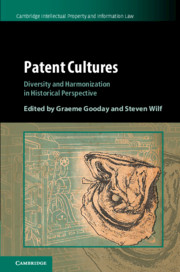Book contents
- Patent Cultures
- Cambridge Intellectual Property and Information Law
- Patent Cultures
- Copyright page
- Contents
- Figures
- Tables
- Contributors
- Preface
- Acknowledgments
- Note on the Cover Image
- Part I Introductory
- Part II Americas
- Part III Southern Europe
- Part IV Central and Eastern Europe
- 10 The Struggle over “the Social Function of Intellectual Work in the Economy of Nations”
- 11 Multiple Loyalties
- 12 Patent Debates on Invention from Tsarist Russia to the Soviet Union
- Part V Asia
- Part VI Epilogue
- Index
- Cambridge Intellectual Property and Information Law
12 - Patent Debates on Invention from Tsarist Russia to the Soviet Union
from Part IV - Central and Eastern Europe
Published online by Cambridge University Press: 23 March 2020
- Patent Cultures
- Cambridge Intellectual Property and Information Law
- Patent Cultures
- Copyright page
- Contents
- Figures
- Tables
- Contributors
- Preface
- Acknowledgments
- Note on the Cover Image
- Part I Introductory
- Part II Americas
- Part III Southern Europe
- Part IV Central and Eastern Europe
- 10 The Struggle over “the Social Function of Intellectual Work in the Economy of Nations”
- 11 Multiple Loyalties
- 12 Patent Debates on Invention from Tsarist Russia to the Soviet Union
- Part V Asia
- Part VI Epilogue
- Index
- Cambridge Intellectual Property and Information Law
Summary
Aiming to develop its nascent industrial economy, in 1896 Imperial Russia adopted a new patent system that borrowed substantially from the German precedent. Yet this system was never embraced with enthusiasm by Russians since in legal, economic, and social terms Russian inventors faced many difficulties casting inventive activity in terms of Patent Office regulations. A series of Imperial and then Soviet patent laws were thus not effective in economic development. Eventually the Soviets would hold up “worker inventiveness” as the vital quality that would thrive under new production relations so thoroughly just and rational as to render patents superfluous. While the 1924 patent law would be a pragmatic concession to European industrial politics, the 1931 statute would reassert the primacy of state enterprises over patent holders, but even this truly Soviet law continued to pay lip service to the durable concern for inventors’ creative authorship.
Keywords
- Type
- Chapter
- Information
- Patent CulturesDiversity and Harmonization in Historical Perspective, pp. 247 - 270Publisher: Cambridge University PressPrint publication year: 2020
- 1
- Cited by

